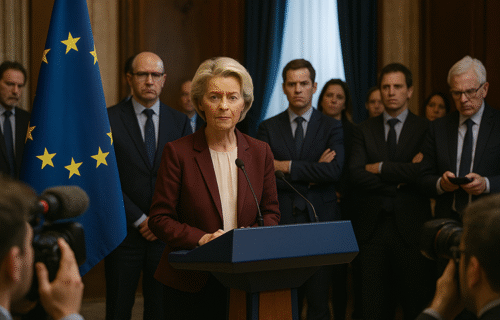A wave of espionage and security concerns has swept through Europe this week, triggering political fallout from Brussels to Warsaw and stirring debates over trust, transparency and accountability inside the European Union. Allegations of a Hungarian-linked spy network, fresh espionage charges in Poland, and heightened terror alerts in Belgium and the Netherlands have created an atmosphere of heightened vigilance — just as NATO begins one of its most sensitive nuclear security exercises in years.
At the centre of the political storm is Olivér Várhelyi, Hungary’s European Commissioner for Neighbourhood and Enlargement, who is facing scrutiny after reports surfaced of an alleged spy network operating in Brussels during his previous diplomatic posting. The European Commission confirmed that President Ursula von der Leyen intends to raise the matter personally with Várhelyi, as pressure mounts from lawmakers and civil society groups to investigate the extent of the allegations.
“Every commissioner must uphold the highest standards of integrity and accountability,” von der Leyen’s office said in a statement that stopped short of confirming any formal disciplinary steps.
Calls for stronger institutional oversight have grown louder. Transparency International urged the European Parliament to establish a special inquiry committee, warning that if the allegations prove credible, they would represent “a serious breach of public trust and a dangerous precedent for EU governance.” A group of 60 academics from 30 European universities signed an open letter demanding that Parliament assess whether Várhelyi’s continued tenure is compatible with the EU’s ethical standards.
Meanwhile, in Budapest, Hungarian Foreign Minister Péter Szijjártó downplayed the controversy, accusing critics of “politicising routine diplomatic activities.” He did not explicitly deny the reports but framed them as “an extension of Brussels’ bias against Hungary’s independent foreign policy.”
In Warsaw, Polish prosecutors have charged a former city registry employee with allegedly helping Russian operatives obtain false identities. Investigators claim the suspect, identified as Tomasz L., illegally copied civil records between 2017 and 2022. The case, now before the courts, has been presented by Polish officials as part of a wider effort to counter Russian intelligence infiltration in the EU.
Former Interior Minister Mariusz Kamiński described the incident as “proof that Russian espionage remains active in the heart of Europe,” adding that Poland’s security services had been “dismantling networks posing as diplomatic channels.” The Internal Security Agency (ABW) said the compromised data could have been used to create “operational identities” for foreign agents across multiple European states.
In the Netherlands, far-right politician Geert Wilders temporarily suspended campaign events after Belgian authorities arrested suspects allegedly plotting attacks against European politicians. The move reflects rising unease over security coordination within the EU — particularly as cross-border threats intersect with political campaigns. Wilders, who has lived under police protection for nearly two decades, said in a statement that “the threats are constant, but this one feels more organised.”
The timing of these developments has amplified anxiety ahead of NATO’s Steadfast Noon exercise, a two-week nuclear deterrence drill hosted by the Netherlands. The operation will involve over 70 aircraft and new measures focused on protecting nuclear storage facilities amid concerns over foreign surveillance near European bases. NATO insists the exercise “is not directed at any country” but acknowledges that the “security environment is more complex than in past years.”
Together, the espionage allegations and heightened security posture illustrate the shifting geopolitical fault lines within Europe — between transparency and secrecy, sovereignty and shared governance, accountability and denial.
Von der Leyen’s insistence on “clarity and confidence within EU institutions” contrasts sharply with the Hungarian government’s defensive tone, while Poland’s firm rhetoric reinforces its identity as a front-line state in Europe’s hybrid confrontation with Russia.
As investigations unfold in Brussels and Warsaw, and NATO continues its military coordination, European leaders face a difficult balance: reassuring citizens that security and democracy can coexist, while acknowledging that espionage, influence, and mistrust are no longer distant concerns — but part of Europe’s political reality.
